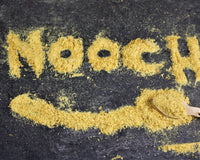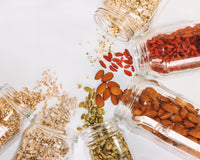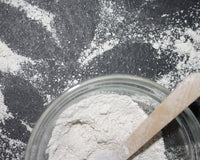The relationship between food and Irritable Bowel Syndrome (IBS) is a complex one, but when used hand-in-hand with medical treatment prescribed by your doctor, embracing a smart eating strategy can help you to better manage and control your IBS symptoms.
In the same way that no two people are completely alike, there is no universal diet that will suit everyone affected by IBS. It is likely that a period of trial and error is necessary while you seek out your own version of some of the more established food regimes. But, with a little patience, you will no doubt find an eating plan that will empower you to keep your IBS under control.
In this article, we explain more about the diets which can help ease IBS symptoms and the best foods you can eat if you suffer from the condition.
What is Irritable Bowel Syndrome?
Irritable bowel syndrome (IBS) is a common condition that affects the digestive system. Symptoms include stomach cramps, bloating, diarrhoea and constipation which tend to come and go and last for differing periods of time.
While IBS is a chronic condition that cannot be cured, it can be controlled with a combination of diet and lifestyle changes, and medication.
Patients are typically diagnosed with one of three different types of IBS. These include:
· Diarrhea-predominant (IBS-D)
· Constipation-predominant (IBS-C)
· Mixed bowel habits (IBS-M)—i.e., alternating constipation and diarrhoea
Benefits of Diets, Lifestyles, and Medicines
There's no single diet or medicine that works for everyone with IBS, but there are lots of things that can help manage the condition, including trying to find ways to relax, getting plenty of exercise, and carefully managing your diet.
While the exact cause of IBS remains unclear, scientists do know is that specific foods and dietary practices are closely aligned to the onset of its symptoms. Based on a review of the current research, the American College of Gastroenterology (ACG) found two diets, in particular, to be significantly effective in treating IBS symptoms: the low-FODMAP diet and the gluten-free diet.
We go on to describe this diet duo below, but it is worth saying that it is likely that an individualised approach will be needed to create an effective and sustainable diet plan, ideally under the supervision of a medical professional.
What is a Gluten-free Diet?
Many people with IBS experience an improvement in symptoms when they eliminate gluten from their diet. Before starting a gluten-free diet, it is important to test for celiac disease.
Gluten is a protein found in foods that contain cereals grains such as wheat, rye, and barley. It is also commonly added to processed foods, such as canned and boxed items.
If you avoid gluten, there are plenty of foods you can choose from to ensure a well-balanced diet, including fruits, vegetables, legumes, certain whole grains, dairy products, and oils, as well as fresh meat, fish, and poultry.
What is a Low-FODMAP Diet?
While most people are familiar with the notion of a gluten-free diet, some may not have heard of the concept of FODMAP.
FODMAP is an acronym for fermentable oligosaccharides, disaccharides, monosaccharides, and polyols. Aside from being a mouthful to say, these are the short-chain carbohydrates found in many foods that tend to ferment and increase the volume of liquid and gas in the small and large intestine. It is this additional liquid and gas can lead to the development of flatulence, bloating, and abdominal pain – the hallmarks of IBS.
We talk more about the low-FODMAP diet in our blog.
The 10 Best Foods for IBS Symptoms
Now that we have identified two diets that help to ease the symptoms of IBS, here is a rundown of some specific foods associated with these that you can eat if you suffer from IBS.
1. Lean meats
Be sure to make protein-rich, low-fat lean meats a staple of your daily diet, such as white meat chicken, white meat turkey, pork, and lean cuts of beef (sirloin, top round, eye round, bottom round). Protein is easily digestible and not fermentable by gut bacteria, meaning you can say goodbye to unwanted intestinal gas.
Avoiding fatty cuts of meat means you’re less likely to consume pro-inflammatory fats or unhealthy toxins which can trigger symptoms.
2. Eggs
For most people eggs are easily digested and so usually make a safe bet for someone who has IBS. It helps that eggs are so versatile and can be enjoyed hard-boiled, soft-boiled, scrambled, or poached, or as the base ingredient in firm favourites such as omelettes and frittatas, making them a go-to option when eating out.
Please note that some people report a sensitivity to the proteins and fat content in eggs, so a degree of trial and error may be required.
3. Salmon and Other Omega-3 Fish
Inflammation can be a contributing factor to IBS symptoms so incorporating foods rich in omega-3 fatty acids will be a smart move as they are proven to dampen inflammatory reactions.
Good fish sources of omega-3 fatty acids include anchovies, black cod, herring, mackerel, rainbow trout, sardines, and wild-caught salmon.
4. Low-FODMAP Vegetables
In many cases, people who have IBS make an effort to avoid vegetables because they have made their symptoms worse in the past. However, vegetables are very good for your gut flora, and therefore may be good for your IBS!
As is familiar territory for those with IBS, it may take a period of experimentation to see which vegetables can be tolerated, starting with those less likely to contribute to gas a bloating and gradually broadening your range.
Good vegetables to try initially include broccoli, carrots, celeriac, green beans, parsnip, potato, squash, and sweet potato.
It’s also suggested to cook vegetables as the process breaks down the fibres within the vegetable tissue making them easier to digest. Steaming, sautéing, and roasting are great ways to prepare a delicious vegetable dish.
5. Low-FODMAP Greens
Leafy greens are packed with nutrients and are not likely to cause gut fermentation, making them a perfect side to every meal. Whether you are sautéing them in a pan with olive oil and a pinch of seasoning, steaming, or adding to a stir fry, cooking them could be gentler on your digestive system.
We’re talking about tasty greens such as bok choy, kale, baby spinach, and swiss chard.
6. Low-FODMAP Fruits
Like vegetables, fruits have some nutrients that are good for your gut flora and therefore should be beneficial for your IBS. However, it is advisable to slowly introduce those that are low in FODMAPs first as you work out which could result in a flare-up of your symptoms. You might want to remove the skin to help reduce the consumption of insoluble fibre.
Ones to try include bananas, blueberries, grapes, kiwis, lemons, limes, olives, oranges, pineapples, raspberries, rhubarb, and strawberries – your fruit bowl never looked so good!
7. Nuts
Nuts are what we call a ‘triple threat’, being a good source of fibre, protein, and omega-3 fatty acids. Perfect for snacking or spreading on your toast in butter form!
Nuts do contain unsaturated fat—but it is thought that this healthy form of fat is good for your gut flora and therefore may be good for your IBS.
Some nuts to add to your snack drawer include brazil nuts, macadamia nuts, pecans, pine nuts, and walnuts.
8. Seeds
Chia seeds and flaxseed seem to be most beneficial for people who have IBS as good sources of fibre and omega-3 fatty acids - particularly if you tend to experience constipation.
Pumpkin and sunflower seeds are also great additions to your diet.
Enjoy sprinkled on salads or oatmeal, or added to smoothies. Bear in mind that flaxseeds need to be ground before use.
9. Fermented Foods
Fermented foods have long been a staple in many traditional diets, but are now enjoying an increase in popularity due to their health-boosting benefits to your digestive and immune systems.
Try to incorporate fermented drinks such as kefir or kombucha, fermented vegetables like sauerkraut and kimchi, and yoghurt (without added sugar) – all contain natural strains of probiotics.
10. Bone Broth
Homemade bone broths are starting to make a comeback due to a theory that the nutrients within are good for the health of the gut flora and the intestinal lining.
Also, as it’s already in liquid form, making it easy on your stomach!
Support for Those with IBS
One of the most challenging aspects of living with IBS is identifying (and avoiding) the foods that set off IBS symptoms, hopefully, this blog has given you some tips to incorporate into your diet and will help you to find some balance.
If you are struggling to cope with your diet, speak with your doctor who can help you to make some adjustments. There are also plenty of IBS support groups on Facebook as well as community forums offered by the non-profit IBS Patient Support Group.






